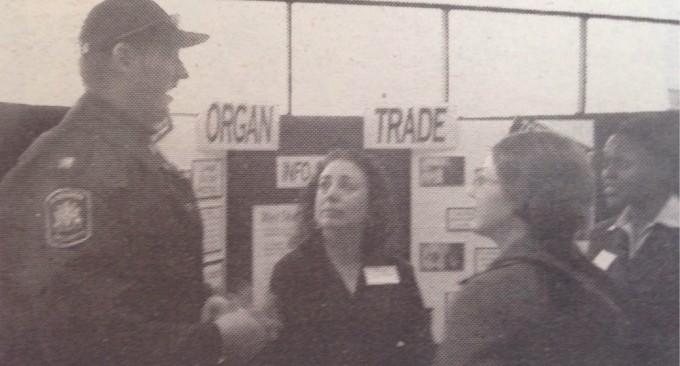By Melissa Godsoe
A fourth-year new media student was reprimanded by security yesterday after she went ahead with an organ trading hoax, despite administration forbidding her to do so.
Megan Dalrymple created a company called Medical Endeavours and Discoveries Inc. that offered students cash for donation of their kidneys, parts of their liver, lungs or colons.
As part of her thesis, Dalrymple argued that people rarely bother to seek multiple sources of information before forming an opinion. Instead, they are inclined to take one source of information as fact.
She flooded the campus with posters that offered cash for vital organs and provided information about the company on a website. Administration contacted RyeSAC about the controversial posters, which RyeSAC had approved.
“Our concern was that it may have represented something that was of an illegal nature,” said Julia Lewis, director of the campus centre of environmental health and safety.
Dalrymple said more than 160 of her posters were taken down by RyeSAC last week.
She met with an ethics review board on Monday to discuss the project and was told she would not be permitted to hold the seminar in the Metro Credit Union lounge yesterday afternoon.
Dalrymple was told to wait in the lounge at noon and apologize for deceiving people about the nature of the event and her motive for attempting to hold it. Michael Dewson, associate vice-president of faculty said the project had caused a great deal of concern around campus and he was not prepared to allow Dalrymple to go ahead with seminar.
“The decision was made because of concerns that the project had not been properly assessed for potential risks for other students and the university,” he said.
Dalrymple told very few people about her project in an attempt to protect the accuracy of her findings and to document people’s reaction to her organ business. She is frustrated with administration’s decision that she said would have derailed her project.
“I was upset how I was made out to be a big liar,” she said. “I have to accept some responsibility. I should have let administration know a little more about the project but I was afraid of them leaking it or shutting me down.”
Dalrymple used the seminar as a means of conveying the message of her thesis to students. She’s spent roughly $650 on the project to date and scattered eight hidden microphones and two hidden cameras to catch reactions of people. Two actresses volunteered to act as representatives of the organ company and Dalrymple collected students’ addresses under the guise of sending information about the organization. Instead she will send them the findings of her project. There was also a ballot box to win a golf shift, but Dalrymple admitted this was another way to obtain people’s information.
In about a weeks time the website will reveal the hoax.
Julie Levene, a third-year nursing student, said the company had every right to be on campus. She felt that there was a dangerous element in that some people were not well informed and mentioned “rumours flying around that people thought their tuition would be reimbursed if they donated their organs.”
Richard Fenn, a second-year computer science student, said he thought administration was within its rights to bar the seminar from campus.
“They have every right to ban it,” he said. “but if they really wanted to ban it, they’d be here.”
Administration was concerned that Dalrymple was misleading and deceiving students. But she said she was attempting to prove a pint.
“People have become so lazy, I mean do your research,” she said. “People read a couple of [newspaper] articles and shoot off their mouths as though they are informed. They look at not-so-credible websites and think they are informed. We need to take some time.”
The website provided clues that the company was not real if individuals chose to dig. It listed a phony toll-free number, a non-existent post office box and a legal disclaimer that the company was a “simulation” of a real company.
Security arrived at 2 p.m. to shut down Dalrymple’s seminar.












Leave a Reply